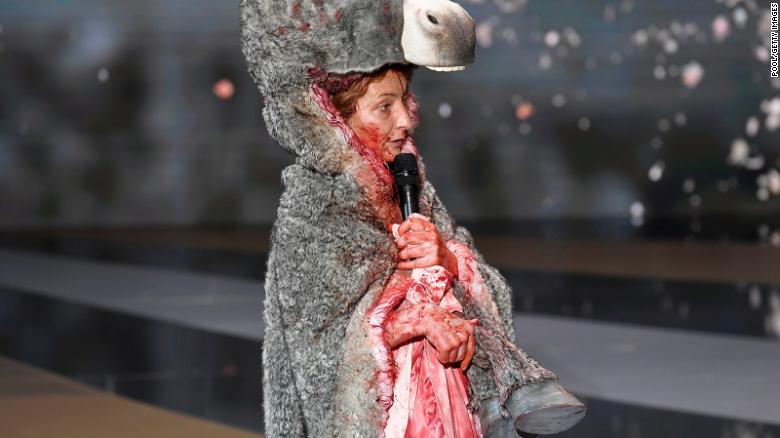“Children are the main victim of the occupation,” Quzmar said. “They're paying the price of the occupation every day of their lives.”
Jaber Hmeidat says his sons, ages 9 and 12, left their home in the hills south of Hebron earlier this week to forage for akoub, a wild artichoke-like vegetable that is currently in season.

So he was stunned to learn that the children had been detained by Israeli forces.
“They were terrified,” he said in an interview Thursday, the day after their detention. “They couldn’t sleep all night.”
The father of nine said he spent Thursday trying to reassure his children and to explain that what happened is part of life for Palestinians living under the Israelioccupation.
“I worked so hard to raise their spirits,” he said.
Hmeidat added that the incident had made him angry and said had he been present he would've tried to intervene.
“I would not have let them take the children, it would have been over my dead body,” he said.

Video of the incident was circulated widely on social media and shared furiously by activists as the latest insight into Israel’s treatment of Palestinians.
The Israeli rights group B’Tselem, which published the video, said five boys, ages 8 to 13, were detained Wednesday by the Israeli army after picking akoub near a settlement outpost in the occupied West Bank.
Israeli police said in a statement that the military had detained four minors for allegedly breaking into private property and stealing parrots and other objects. The Israeli Defense Forces said a group was spotted entering private property in the southern Hebron area and was transferred by a military patrol to the Israeli police after "a short initial questioning with police present." The police said they had not detained the children after they were transferred by the IDF and had tried to locate their parents for “several hours” before waiting for them to collect them.
But while the exact circumstances of the children's detention remains unclear, the incident offers a window into the reality of life under Israeli occupation, rights groups and some Palestinians say.
Whether they were simply picking wild vegetables or allegedly stealing parrots, they contend, there is no reasonable scenario in which children as young as 8 should be detained by armed soldiers.
“It shows first and foremost the absolute disregard Israeli authorities have for the well-being of Palestinians,” Amit Gilutz, B'Tselem spokesperson, said.
"Palestinians are constantly being dehumanized,” he said.
Gaby Lasky, a human rights lawyer who is representing the children, said they were released five and a half hours after being detained on Wednesday by the Israeli army. The two oldest, who are 12 and 13, were ordered to return next week for questioning, she said.
Israeli police said two boys were summoned with their parents on suspicion of stealing the parrots and other objects.
The age of criminal responsibility under Israeli military law, which governs Palestinians living in the West Bank, is 12, according to UNICEF.
Lasky told NBC News that the children said they did not steal anything.
“It was really a matter of telling the boys to go back home or move away a little bit and that’s it,” she said. “Their detention was humiliating.”
Video footage published by B’Tselem and shot by Israeli activists appears to show the children picking plants and putting them in buckets.
Separate footage shot by a B'Tselem field researcher later that day appears to show armed soldiers detaining and manhandling young boys — believed to be the same children — into a white military vehicle as bystanders look on. At one point, an older child tries to pull one of the children out of the grip of one soldier, only to be yanked away by another.
It was unclear what may have happened in the time between the two videos.
The children were detained near Havat Maon, a settler outpost that is illegal under Israeli law, according to B’Tselem. There are dozens of these outposts in the West Bank, in addition to some 130 officially recognized settlements, according to Peace Now, a group that advocates for an independent Palestinian state.
The Palestinians view all settlements as illegal and a major obstacle to their goal of establishing an independent state that includes the West Bank, which Israel captured in the 1967 war.
Most of the international community considers the Palestinian territories to be occupied and also largely views the settlements as illegal and an impediment to peace. However, beginning as early as 2017, U.S. officials began dropping public references to the West Bank as “occupied" and in 2019 the U.S. reversed its decadeslong position that Israeli settlements in the West Bank are illegal.
Seven hundred Palestinians under the age of 18 were arrested by the Israeli authorities in 2020, according to Khaled Quzmar, the general director of Defense For Children International-Palestine, a group that works to defend the rights of Palestinian children. It was not clear if that included children who were detained in this incident.
More than 150 Palestinians under the age of 18 were held in Israeli custody, both detainees and prisoners, at the end of September, according to B’Tselem.
“Children are the main victim of the occupation,” Quzmar said. “They're paying the price of the occupation every day of their lives.”
Saphora Smith reported from the U.K. and Lawahez Jabari from Jerusalem.









